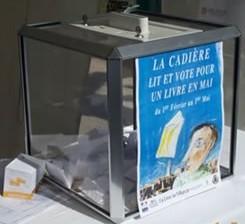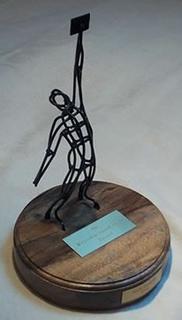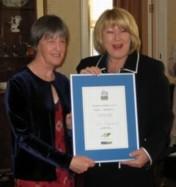The Waverton Good Read Award
 On October 7th, one of the first events in the Chester Literature Festival is a dinner to celebrate the Waverton Good Read Award. Waverton is a village just a few miles outside Chester. This year’s winner was Jonathan Trigell with BOY A which I shall blog about later. The Waverton Good Read award emulates the Le Prix de La Cadière which is now in its fifth year. It was started by the doctor in Cadière (population 4 000) because he thought that a good book might be as useful to his patients as the medication he would prescribe. This looks fascinating and shall be investigating this in detail soon.
On October 7th, one of the first events in the Chester Literature Festival is a dinner to celebrate the Waverton Good Read Award. Waverton is a village just a few miles outside Chester. This year’s winner was Jonathan Trigell with BOY A which I shall blog about later. The Waverton Good Read award emulates the Le Prix de La Cadière which is now in its fifth year. It was started by the doctor in Cadière (population 4 000) because he thought that a good book might be as useful to his patients as the medication he would prescribe. This looks fascinating and shall be investigating this in detail soon.The Waverton Good Read (for more detail see this amusing article from the Daily Telegraph here ) is an award for first adult novels by British Writers published in the previous twelve months. The aim is stimulate reading and provide encouragement to British writers. I think this is an excellent idea because British writers (and those of other nationalities) need all the encouragement they can get - it is a hard cruel world out there.

One of the organisers, Gwen Goodhew (left in the photo with Wendy Smedley when they received an award from Cheshire County Council in the Cheshire annual celebration of Rural Women's achievements), has kindly answered a few questions about the award.
Clare Dudman: How did the scheme start?
Gwen Goodhew: Wendy Smedley (the other initiator and organiser of the scheme) read an article by Susannah Hickling in the Daily Telegraph about a similar scheme in a village in France and thought it would be a good scheme to start in Waverton. She kept waving the article in front of my nose until I agreed to go in with her. We met Susanna Hickling in 2004 when we went over to France to see how they ran their scheme (she lives there now). We also met the doctor, Dr Dufour who started off the scheme there.
 C.D: Yes, I was going to ask you about that - were there any differences?
C.D: Yes, I was going to ask you about that - were there any differences?G.G: Well it’s changed now. They started off with debut novels (in French, of course) but now it has evolved into something different - now they have started asking people to suggest favourite books, which I don’t think works as well. Also their methods of collection are different. In Waverton, in the early stages the books are collected from mine and Wendy’s homes, and then later on from the hairdresser, post office and various places throughout the village. In France all the books are collected from the pharmacie.
C.D. That must make things a bit busy for the pharmacist.
G.G: Well, she’s one of the organisers of the scheme over there.
C.D: Is the doctor happy with how the scheme has worked out? Has he found that the scheme has benefitted the villagers’ health?
G.G: Well he finds that they are talking books now instead of talking about their ailments.
C.D: Has the same thing happened in Waverton?
G.G: People chat about the books now - it has introduced different dynamics into the village.
C.D: How did you find the books?
G.G: It was quite difficult. First of all we tried the websites of literary prizes, then websites of publishers (which are a lot better now than they were) and then we rang publishers to ask them if they have any books that were eligible. It was not a perfect system, and we still haven’t found one. We have found that some publishers are more supportive than others, and I suppose it depends on who you happen to contact on the day. A few publishers haven’t replied at all.
C.D: That’s quite surprising - you’d think they’d be pleased.
G.G: Yes. They have to be published between certain dates: For this year it is between 1st September 2004 to the 31st August 2005.
 THE WAVERTON TROPHY
THE WAVERTON TROPHYC.D: How many people do the reading?
G.G: About 100 altogether. Some read solidly - others drop in and drop out. We have recently included the small hamlet of Bulkeley because a group there were interested and there were not enough of them to carry on on their own. In the later stages of the year we also included a woman’s prison. They voted on the final five books.
C.D: Do you think that changed the voting?
G.G: I noticed there was not a single vote for the Stella Rimington book - the rest were equally divided. But this did not alter the final result.
C.D: Is it mainly women who read?
G.G: Yes, unfortunately. There are some men but we are trying to get more men involved - trying to find books that interest them - they tend to prefer non-fiction.
C.D: How about the age range?
G.G: That is quite broad. It ranges from pupils in Christleton High school (interested sixth formers) to a group of young married women with young children and then a large block of people in their fifties to sixties up to the very oldest inhabitants.
C.D: One hundred people out of a population of two thousand is quite a proportion of the village.
G.G: Yes, especially if you take away the children. It’s quite good.
C.D: Would you say it had changed village life?
G.G: Yes, definitely - I can’t say in a concrete way, exactly, but it has changed villagers’ perception of the village and themselves.
C.D: I suppose it has put Waverton on the map.
G.G: Yes, something you wouldn’t expect for a village this small.
 C.D: Have you any anecdotes from your visit to France?
C.D: Have you any anecdotes from your visit to France?G.G: We thought the final ceremony was quite amusing because it was quite different from ours. Our results are announced at the village fete and we realise that people’s attention span is not gong to be that long so we get it over with quite quickly. But in France it is far more intellectual - there are readings from teenagers, and awards for stories, and presentations of bound volumes - the stories have been collected together and bound into a book and the winners each receive one.
C.D: That sounds good.
G.G: Yes it was, but it took such a long time, and our French wasn’t that good - and we’d not much idea what they were saying and every now and again they’d look at us and laugh and we would have to laugh too...
C.D: How long did it take?
G.G: Oh I don’t know, you’d have to ask Wendy. A long time, and they were so laid back - they started an hour late because they needed to find tables and loud speakers and so on.
C.D: Where in France is this place?
G.G: In Provence, a hilltop village, La Cadière D'Azur.
C.D: Have other places expressed an interest in starting up a similar award?
G.G: After we were on the culture show we were contacted by various people, but I haven’t heard whether any went ahead.
C.D: I heard there was one being set up nearby, in Upton, but not heard anything more about it recently. Was it a lot of work to set the award up? Did it require a lot of organisation?
G.G: Yes! Well for Wendy and I it has pretty much taken over our lives. We decided to put a bit of our own money in to set it up and then after we’d decided to do that we went to Borders to buy the books - she started at one end, and I started at the other and after a time we met again and we’d only managed to find a couple of nooks each. It’s then that we stated looking on the internet. There is a website devoted to debut novels now. It didn’t exist when we started. There haven’t been so many this year, but they have been of higher quality.
C.D: Has the book award initiated any interest in the readers having a go at writing themselves?
G.G: No, not really - one funny thing I noticed at the end of one of our meetings was that when someone suggested to the readers that they had a go at writing themselves the reaction was one of complete horror...
Which seems a good place to end.


Wendy and Gwen were finalists in Granada TV's 'Local Heroes' Competition and the photographs above show them each receiving certificates from Granada's Marketing Director.

0 Comments:
Post a Comment
Comments are subject to moderation.
<< Home